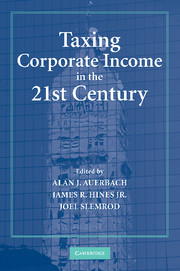Book contents
- Frontmatter
- Contents
- Contributors
- Preface
- 1 The Effects of Taxes on Market Responses to Dividend Announcements and Payments: What Can We Learn from the 2003 Dividend Tax Cut?
- Comments
- Comments
- 2 Dissecting Dividend Decisions: Some Clues about the Effects of Dividend Taxation from Recent UK Reforms
- Comments
- Comments
- 3 The 2003 Dividend Tax Cuts and the Value of the Firm: An Event Study
- Comments
- Comments
- 4 How Elastic Is the Corporate Income Tax Base?
- Comments
- Comments
- 5 An Empirical Examination of Corporate Tax Noncompliance
- Comments
- Comments
- 6 On the Extent, Growth, and Efficiency Consequences of State Business Tax Planning
- Comments
- Comments
- 7 Corporate Taxation and International Competition
- Comments
- Comments
- 8 The Changing Role of Auditors in Corporate Tax Planning
- Comments
- Comments
- 9 Taxation and the Evolution of Aggregate Corporate Ownership Concentration
- Comments
- Comments
- Index
Preface
Published online by Cambridge University Press: 30 July 2009
- Frontmatter
- Contents
- Contributors
- Preface
- 1 The Effects of Taxes on Market Responses to Dividend Announcements and Payments: What Can We Learn from the 2003 Dividend Tax Cut?
- Comments
- Comments
- 2 Dissecting Dividend Decisions: Some Clues about the Effects of Dividend Taxation from Recent UK Reforms
- Comments
- Comments
- 3 The 2003 Dividend Tax Cuts and the Value of the Firm: An Event Study
- Comments
- Comments
- 4 How Elastic Is the Corporate Income Tax Base?
- Comments
- Comments
- 5 An Empirical Examination of Corporate Tax Noncompliance
- Comments
- Comments
- 6 On the Extent, Growth, and Efficiency Consequences of State Business Tax Planning
- Comments
- Comments
- 7 Corporate Taxation and International Competition
- Comments
- Comments
- 8 The Changing Role of Auditors in Corporate Tax Planning
- Comments
- Comments
- 9 Taxation and the Evolution of Aggregate Corporate Ownership Concentration
- Comments
- Comments
- Index
Summary
Modern governments have taxed income earned by corporations for as long as they have taxed income earned by individuals, yet the economic effects of corporate income taxation remain shrouded in mystery, and the appropriate role of corporate income taxation in generating significant government revenue is as unclear now as it ever was. At the onset of the 21st century, governments continue to rely on corporate income taxes as important revenue sources, the product of uneasy compromises between some forces that would reduce, and others that would increase, the tax burden on corporations.
The ability, and evident willingness, of corporations to locate and structure their activities to avoid corporate income taxes is always an important consideration in the design of corporate tax policy. Governments in an increasingly competitive world face pressures to reduce their tax rates, lest corporations relocate their activities elsewhere in search of more hospitable tax climates. Quite apart from their relocation incentives, high corporate tax rates encourage firms to undertake transactions designed to reduce taxes rather than stimulate productivity and may also have the undesired effect of discouraging business formation and expansion. In most countries, corporate income may be taxed twice – first when earned by corporations and second when received as dividends by taxable individual shareholders – which, in the eyes of some, is unfair, inefficient, and just cause for significant reduction of either corporate- or shareholder-level taxation.
- Type
- Chapter
- Information
- Taxing Corporate Income in the 21st Century , pp. xi - xivPublisher: Cambridge University PressPrint publication year: 2007
- 2
- Cited by

